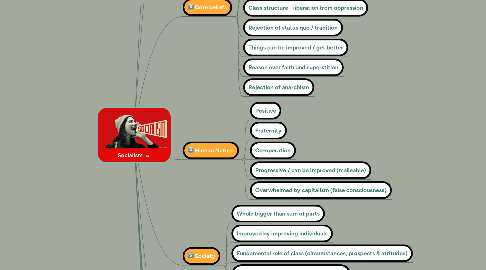
1. Introduction
1.1. Ambiguous
1.2. Contradictory outcomes
1.3. What is socialism?
1.4. Socialism v Communism
2. Origins
2.1. Industrial revolution
2.2. Enlightenment (shared beliefs with Liberalism)
2.2.1. Optimistic view of human nature
2.2.2. Reason over faith
2.2.3. Progressive
2.2.4. Liberation from oppression
2.2.5. Reject traditional state (monarchical absolutism)
2.2.6. Foundational equality
2.2.7. Reject anarchism
2.3. Utopian socialists
2.3.1. Robert Owen
2.3.1.1. Work
2.3.1.2. Work
2.3.2. Rejected by Marx
2.3.3. Utopian socialist in Seattle?
3. Core beliefs
3.1. Equality of opportunity and equality of outcome
3.2. Collectivism
3.3. Individuals are a product of society
3.4. Class structure - liberation from oppression
3.5. Rejection of status quo / tradition
3.6. Things can be improved / get better
3.7. Reason over faith and superstition
3.8. Rejection of anarchism
4. Human Nature
4.1. Positive
4.2. Fraternity
4.3. Co-operation
4.4. Progressive / can be improved (malleable)
4.5. Overwhelmed by capitalism (false consciousness)
5. Society
5.1. Whole bigger than sum of parts
5.2. Improved by improving individuals
5.3. Fundamental role of class (circumstances, prospects & attitudes)
5.4. Independent construct (develops from people) - society is what we want it to be
5.5. Foundational equality + formal equality + social justice
6. Economy
6.1. A source of massive inequality, so it must be addressed
6.2. Capitalism threatens human nature, socialism reflects it
6.3. Core policies
6.3.1. REDISTRIBUTION
6.3.1.1. Progressive taxation
6.3.1.2. Progressive public spending
6.3.1.3. Extensive public services
6.3.1.4. Collectivisation - state / common ownership
6.3.2. Extensive regulation of capitalism
7. The state
7.1. Bigger
7.2. Wither away?
7.3. Extent of = big disagreements amongst various socialism strands
8. Key thinkers
8.1. Karl Marx and Friedrich Engels - Dialectical materialism
8.1.1. Class
8.1.2. Class struggle
8.1.3. False consciousness
8.1.4. Dialectical materialism
8.1.5. Wrote Communist Manifesto & Das Kapital
8.1.6. Fan of capitalism!
8.1.7. Overview
8.2. Rosa Luxemburg - Spontaneous revolution
8.2.1. inevitability of the triumph of revolution
8.2.2. capacity of the masses
8.2.3. spontaneity
8.2.4. party oriented class struggle
8.3. Beatrice Webb - Inevitability of gradualism
8.3.1. inevitability of gradualism
8.3.2. co-operative movement
8.3.3. co-operative federalism
8.3.4. co-operative individualism
8.4. Anthony Crosland - Keynesian economics
8.4.1. Keynes
8.4.2. Keynesian economics
8.4.3. criticism of Marxism/Revisionism
8.4.4. rejection of nationalisation as central goal of Labour Party
8.4.5. political values of personal liberty, social welfare and equality
8.4.6. No mechanism for change as socialism and capitalism coexist
8.5. Anthony Giddens - The third way
8.5.1. rejection of traditional conception of socialism
8.5.2. the ‘Third Way’
8.5.3. combination of right wing economics and left wing social policies ("fiscally conservative, socially liberal")
8.5.4. No mechanism for change as socialism and capitalism coexist
9. Types
9.1. Fundamentalist
9.1.1. Classical Marxism
9.1.1.1. Capitalism to socialism to communism
9.1.1.2. Mechanism = revolution
9.1.1.3. Big role for capitalism!
9.1.1.4. Alienation
9.1.1.5. Class consciousness
9.1.1.6. International
9.1.1.7. Dictatorship of the proletariat
9.1.1.8. State will wither away
9.1.1.9. Historical (dialectical) materialism
9.1.2. Marxism-Leninism
9.1.2.1. Doesn't require capitalist stage in dialectic
9.1.2.2. Vanguard elite
9.1.2.3. Dictatorship of the proletariat - democratic centralism
9.1.2.4. Socialism in one country doctrine
9.1.2.5. Mechanism = revolution
9.1.3. Democratic Socialism
9.1.3.1. Mechanism = inevitability of gradualism
9.1.3.2. Keynesian economics
9.1.4. Euro-Communism
9.1.4.1. Antonio Gramsci
9.1.4.2. Cultural hegemony establisted by capitalism
9.1.4.3. Socialist cultural vanguard required
9.1.4.4. Mechanism = ballot box via gradualism and cultural hegemony shift
9.1.4.5. No need for revolution or dictatorship of the proletariat
9.1.4.6. Gradualist / evolutionary
9.1.5. Neo-Marxism
9.1.5.1. Mishmash of ideas based on classical Marxism
9.1.5.2. Cultural vanguard
9.1.5.3. State sponsored anti-socialist forces were too powerful for evolutionary change
9.1.5.4. Mechanism = spontaneous revolution
9.1.5.5. Ralph Miliband (father of Ed and David)
9.2. Revisionist
9.2.1. Classical Revisionism
9.2.1.1. Eduard Bernstein "Evolutionary Socialism" 1898
9.2.1.2. Widening franchise with 2 Reform Acts in response to French Revolution
9.2.1.3. "A rising tide raises all boats"
9.2.1.4. Capitalism was adapting - not revolting
9.2.1.5. Mixed economy = socialism and capitalism can co-exist
9.2.1.6. Mechanism = gradual adaptation of capitalism enables more socialist state
9.2.2. Social Democracy
9.2.2.1. Emerged strongly after the Great Depression 1930s and WW2
9.2.2.2. Keynesian economics
9.2.2.3. Managed / reformed capitalism
9.2.2.4. Government intervention during recessions (e.g. New Deal in USA)
9.2.2.5. Anthony Crossland "The Future of Socialism" 1956
9.2.2.6. Inequality to be attacked not just economically but also by greater equality in education
9.2.2.7. Mechanism = None (co-exist). Gradual adaptation of capitalism enables more socialist state
9.2.3. Third Way
9.2.3.1. Associated with new Labour and Tony Blair
9.2.3.2. Came to prominence after fall of communism in early 90s
9.2.3.2.1. The victory of capitalism?
9.2.3.3. Anthony Giddens = Key Thinker
9.2.3.4. Close to paternalistic conservatism?
9.2.3.5. Capitalism with a social conscious?
9.2.3.6. Is it truly socialist?
9.2.3.6.1. Privatisation
9.2.3.6.2. Deregulation (e.g. financial sector)
9.2.3.6.3. PFI used to build hospitals
9.2.3.6.4. Extreme wealth is OK provided you pay your taxes
9.2.3.6.5. Fiscally conservative and socially liberal
9.2.3.7. Mechanism = None (co-exist). Gradual adaptation of capitalism enables more socialist state
